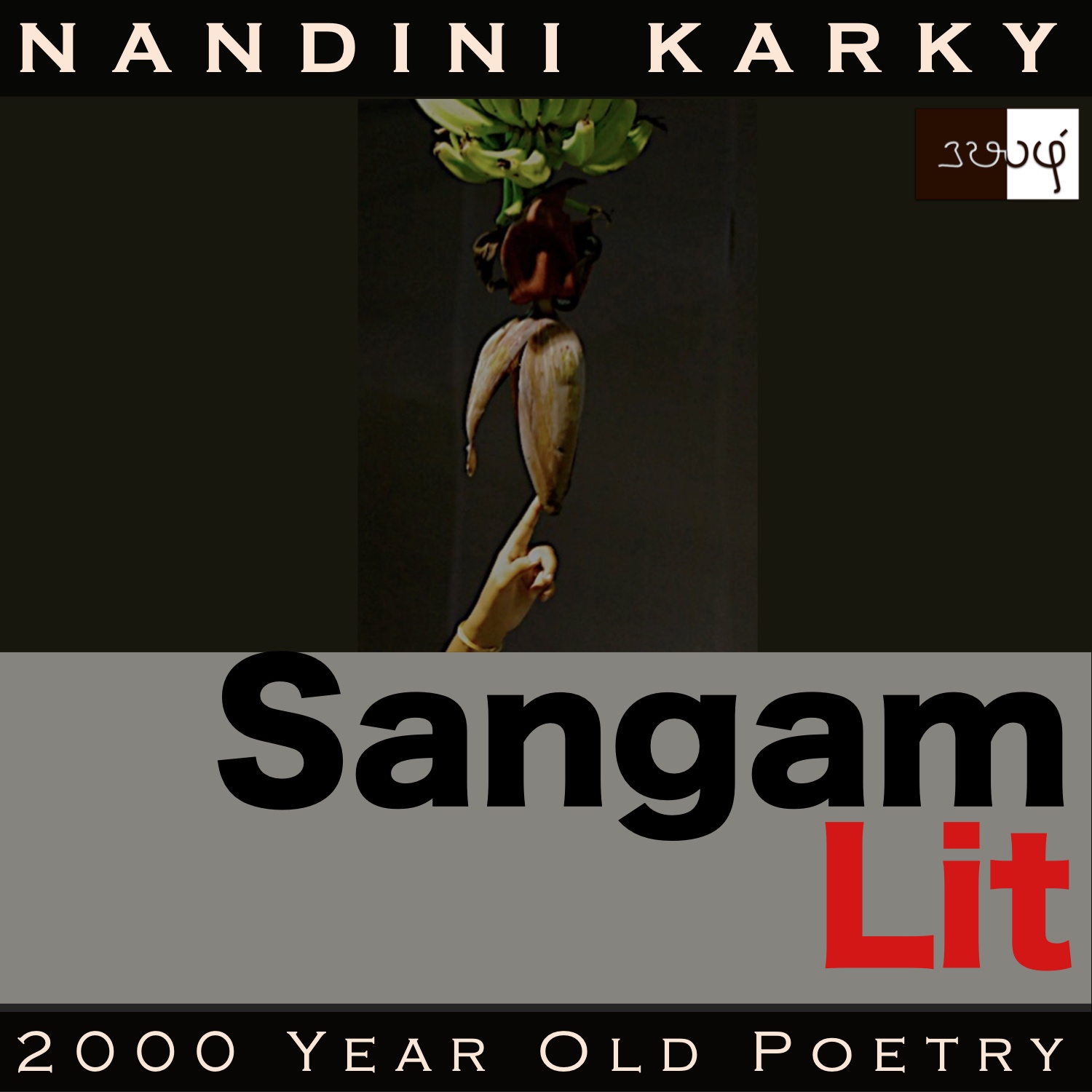Podcast: Play in new window | Download
Subscribe: Apple Podcasts | Spotify | Amazon Music | Android | iHeartRadio | TuneIn | RSS | More

In this episode, we learn an intricate technique to convey intention and the philosophical truth ingrained within, as depicted in Sangam Literary work, Natrinai 188, penned by an anonymous poet. Set in the mountain country of ‘Kurinji’, the verse speaks in the voice of the confidante to the man, conveying a subtle but strong reprimand about his delay in seeking the lady’s hand in marriage.
படுநீர்ச் சிலம்பில் கலித்த வாழைக்
கொடு மடல் ஈன்ற கூர்வாய்க் குவி முகை,
ஒள்ளிழை மகளிர் இலங்கு வளைத் தொடூஉம்
மெல் விரல் மோசை போல, காந்தள்
வள் இதழ் தோயும் வான் தோய் வெற்ப!
‘நன்றி விளைவும் தீதொடு வரும்’ என
அன்று நற்கு அறிந்தனள் ஆயின், குன்றத்துத்
தேம் முதிர் சிலம்பில் தடைஇய
வேய் மருள் பணைத்தோள் அழியலள் மன்னே.
A luscious mountain land welcomes us with the phrase ‘படுநீர்ச் சிலம்பில் கலித்த வாழை’ meaning ‘a plantain flourishing in the fertile mountain springs’. ‘கூர்வாய்க் குவி முகை’ is the striking word-portrait of a banana flower meaning ‘a sharp-mouthed, converging cluster’. An ancient ornament is hinted at, in ‘மோசை’, worn on the ‘மெல் விரல்’ or the ‘gentle finger of a woman’. More on ‘mosai’ soon! It’s not only the edible banana flower that this poem illustrates but also, the radiant ‘flame lily’ or ‘காந்தள்’. The verse ends with the delicious imagery of ‘தேம் முதிர் சிலம்பு’ meaning ‘honey filled mountains’ and ‘வேய் மருள் பணைத்தோள்’ meaning ‘bamboo-like fleshy shoulders’. Let’s journey beyond the skin to perceive the meaning of this mountain song.
The man and lady have been in a love relationship and the man has been trysting with her by day. The confidante perceives the lady’s worry as the man does not seem keen on formalising the relationship. One day, when he arrives for a tryst by day with the lady, the confidante tells him, “On the mountains watered by deep springs, grows a plantain tree. From the curved leaf of this tree, blossoms a sharp-mouthed, closed bud of flowers. In the way, a ‘mosai’, worn on the slender finger of a woman wearing shining jewels, touches the curved bangle on her wrist, the plantain bud touches the luxuriant petals of the flame-lily in your sky-high mountain country, O lord! If she had perceived clearly that ’Something that produces joy may later bring forth suffering’, then her thick shoulders, akin to the bamboo flourishing on the mountain slopes filled with honey, would not have been ruined!” With these words, the confidante denies the man his tryst with the lady and in a hidden manner, presses on the importance of his seeking the lady’s hand in marriage.
Now, to relish the hidden layers within! The confidante sketches for us, an image from the mountains. It’s a mountain slope, filled with deep underground springs. With the aid of the richness of that mountain soil and copious flow of water, plantain trees bloom in comfort. In one such plantain tree, from the curved leaves, drops down a plantain flower. A moment’s pause to meander! I have always wondered what’s the difference between a plantain and a banana. Are these same names given to the fruit by different groups of people? Turns not it’s not so. A plantain is a starchier variety of banana, that is said to haveless sugar. So, banana is the one used as a fruit whereas plantain would be the one used in savoury snacks such as chips. Anyone who lives in or has been to South India would have relished the ‘Vazhaikkai chips’, a delicacy from Tamilnadu’s sister state, Kerala. Not surprising because most of the songs from the ‘Kurinji’ mountain country turn out to be situated in ‘God’s own country’, the epithet for the state of Kerala. Returning from our wandering, we take in the plantain flower hanging on the mountain slope. The confidante says that this plantain flower touches the petals of the flame-lily and to her, this appears like a ‘mosai’ ring touching the bangle worn by that well-adorned Sangam woman. On searching, I learnt that the ‘mosai’ refers to a ring-like ornament in the shape of a plantain flower. Sangam smiths seem to have taken their cue from nature to carve this exotic hanging piece of jewellery. From the image in nature and its ornamental simile, the sense we are left with is one object touching another. Is there a hidden significance or is it said by the confidante only to describe the man’s mountain land? From experience, we know that it would be surprising if she did not conceal a metaphor or two!
The confidante continues with a pithy if-only statement. She says that if only the lady had known misery will follow shortly from the hands of that thing that gave her happiness, she might have averted it. And, then her beautiful, thick shoulders would not have lost their health. The confidante is in truth, scolding the man for making the lady lose her health in worry and is wistfully thinking of changing the past where the lady decided to accept the man. Now we understand that the images of the hanging plantain flower and flame lily, as well as the hanging ring and bangle, is to highlight how joy has ended in a complete new thing, which is suffering! With these strong words, the confidante hopes to urge the man to give up causing anxiety to the lady and turn to bestowing lasting happiness to her. The poem brings to my mind, the Taoist farmer and horse story from ancient China, also called as the ‘Maybe’ story. If you haven’t heard of it, do search for it. It’s a thought-provoking tale that tells us that we can never say for sure, what’s good or bad for us, from what it seems like at the moment. In the way that hanging plantain flower touches the blooming flame lily, the thought in this ancient Tamil poem touches upon the truth in that Taoist tale!




Share your thoughts...